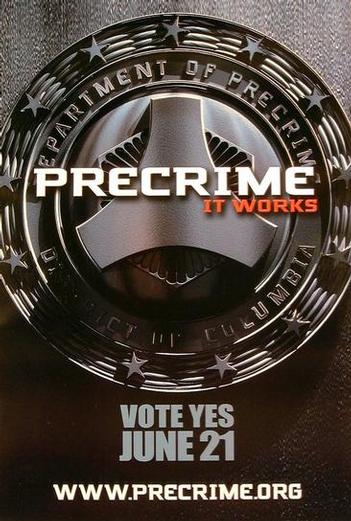Real Life 'Pre-Crime' Technology


Take, for example, Defense Advanced Research Projects Agency (DARPA), the government agency that brought us the Internet. Now, besides working on bullets that will home in on their targets, EXtreme ACcuracy Tasked Ordnance (EXACTO), DARPA is working on algorithms that can be used to predict when someone is getting ready to commit a crime.
Who needs three mutant pre-cogs ala the movie Minority Report and Philip K. Dick's short story The Minority Report it was based on, when you have computers? The theory is, given the right algorithms and computers, the government should be able to figure out when "a soldier in good mental health" may become an "insider threat."
Anomaly Detection at Multiple Scales (ADAMS) is still in its Request for Proposal (RFP) days may sound like science fiction, but really, is there anything that's fictional about it?
Today, we spend hundreds of millions on Internet Search Engine Optimization (SEO). And, what is that all really about? Isn't it just trying to figure out what we're interested in knowing more about and buying? When we wander about the Internet, we leave trails behind us. We call these footprints, 'cookies' when they're on our PCs, but even if we clean those out of our Web browsers, on every Web site we visit we leave our tracks.
Is there any reason we can't use search engine technology to predict crimes? No, there is not. In fact, we're edging closer to doing it all the time. In my own quiet neck of the woods in western NC, twenty-five people were recently arrested for trafficking in child pornography over the Internet.
Were they guilty? I presume so. Like most such cases, they were found to be visiting Web sites or peer-to-peer networks that cater to their vice.
But, how did they find these sites in the first place? Didn't some of them doing it by using Google or Bing? If they had never visited child porn sites, but were found searching for terms that a reasonable person, or the correctly crafted algorithm, would presume that they were looking for child pornography, wouldn't most people want them to be, if not arrested, investigated?
Or, take the case that kicked off the ADAMS project: the dozen plus murders by Army Major Nidal Hasan. From the evidence presented so far it seems clear that the military should have known that Hasan was capable of acting in a way that would be harmful to the country, if not the actual murders themselves. Certainly, if ADAMS had been in place, the presumption is that Hasan would have been 'caught,' before he committed mass-murder.
It sounds great doesn't it? Who doesn't want child abusers or mass murderers caught before they can harm anyone?
But, where do we draw the line? You see, I'm sure ADAMS will work. I just looked at Facebook. I just wrote about being tired after a long trip. What do I see but ads about travel and sleep aids. Funny that eh? Of course, I also see ads for stuff that I don't have any interest in, but I can see how an SEO program might guess from the information on my Facebook page that I might be interested in bands from the 80s.
What about someone looking for information about hand-guns? Pick them up because they might become a murderer? What about someone looking for lock-picks? Should they be picked up because ADAMS predicts that they may be thinking of breaking and entering?
Let's say its 2024, and I just wrote a note about how I miss the good old days when President Obama was still in charge and before Social Security went belly-up so we could keep funding the war in Iran. Could I expect a visit from the local National Guard because I might be guilty of anti-government activities against President Sarah Palin during her third term in office?
Spin it around to the political paranoia fantasy of your choice. Make it Obama is in his fourth term and anyone writing anything on the Web that sounds like it pro-tea-party propaganda is automatically being audited by the IRS. Do we really want to start sliding down the slippery slope of investigating and even arresting for people what they might do? For what they think? For what some computer program thinks they might think?
We need to start deciding now. The Minority Report's pre-crime division isn't a fantasy. It's barely fiction. We will be able to start 'predicting' possible crimes. Sometimes it will be right. Sometimes it will be wrong. Regardless, armed with this kind of information, people may very well start pushing the limits of what's a crime and what it isn't.
You see, I believe that it's only a very short step from one science fiction story, Minority Report, to another, 1984. That's not a journey I want to take. After all, as the movie's tag-line goes, "The system is perfect until it comes after you."